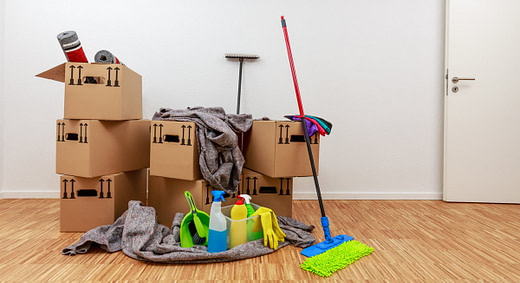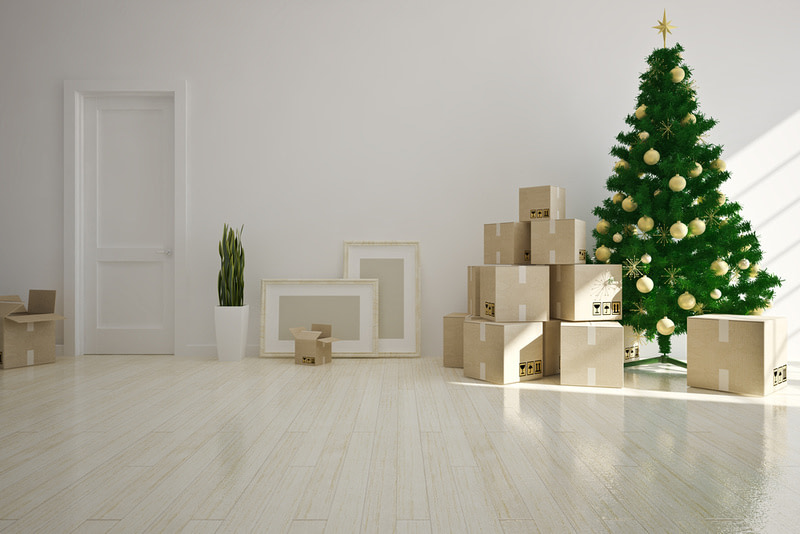Last Updated on June 1, 2023 by Vlad Stoikovich
As if you didn’t have enough to worry about while moving, you also need to think about leaving your previous rental property in good condition.
Of course, you’ll do this because you’re a great tenant who treats properties as if they’re your own, but also because you want to get your bond back!
Australia has a reputation as being one of the most stringent nations when it comes to rental bonds, and the laws and rules often differ from state to state.
To get your move off on the right foot, and your bond money safely in your back pocket, we’ve prepared this complete guide to moving and get your bond back in Victoria.
Before we begin, let’s overview the bond basics
The basics of bond and tenancy rules in Victoria
As you probably know, a rental bond is a lawful way of securing the landlord’s premises in case a tenant causes intentional or unintentional damage to a property.
As a general rule, landlords in Victoria charge the equivalent of one month’s rent as a rental bond. But this varies according to your weekly rent. Note that landlords aren’t legally allowed to request a bond that’s equal to more than a month’s rent if your weekly rent is $900 or less.
By law, the Residential Tenancies Bond Authority (RTBA) should receive all bond deposits. All tenancy agreements in Victoria are governed by the Residential Tenancy Act 1997.
Let’s delve more into a few of the sticky details.
Is a rental bond compulsory in Victoria?
Bonds are not compulsory in Victoria. Some landlords may charge between one to four weeks of rent (depending on the weekly rental fee) while others won’t charge a bond at all.
In Victoria, no tenancy laws stipulate a minimum bond fee, and although unusual, a landlord can decide to not collect a bond.
Bond top-ups in Victoria
In addition to paying a bond when first moving into a home, tenants may need to pay a top-up bond after spending five years on the premises.
Note that bond top-ups are only applicable if there’s a long-term tenancy agreement in place with five or more years remaining, and if the landlord gives the tenant a minimum of 120 days notice.
Condition reports protect both parties
After paying a bond, the tenant should receive two copies of the condition report. This report details the home or apartment’s condition at the start of the tenancy. The tenant must sign a copy and return it to the landlord or the managing agency within three days of occupying the premises.
Note that tenants have the right to agree or disagree with any of the specifics in the condition report. These documents exist to protect both parties.
HomeMove’s top tip: Always complete the condition report form in full and pay attention to the details it contains before you sign. Take photos of any discrepancies and send these to your landlord or property manager so that there’s documentation.
Lodging bond payments with the RTBA
Once a landlord receives a rental bond payment, he or she must lodge the payment with the RTBA within 10 business days. The RTBA then sends a deposit notification to the landlord and the tenant that confirms their receipt of the payment. Tenants can (and should) contact the agency if they don’t receive a deposit notification.
Ending the tenancy and getting your bond back in Victoria
All tenants in Victoria are protected by tenancy laws and can request the return of their rental bond at the termination of a tenancy, provided there has been no breach of the rental agreement (more on that later).
To start the bond refund process, either the tenant or the landlord can visit the RTBA website to download and fill out the bond claim form. If both parties are in agreement and the bond claim form is completed and returned to the RTBA, the agency sends the bond to the tenant.
The new rental laws in Victoria for 2021
In the past, many renters in Victoria were not getting their deposits back in full. Data from the Victorian Civil and Administrative Tribunal (VCAT) showed that in 2015, one-third of tenants in Victoria did not receive their full deposit and very few of these tenants appealed the decision.
As experts have noted, renters who want to avoid future tenancy issues may prefer to simply give up their bonds rather than make waves. As Yaelle Caspi of the Tenants Union of Victoria puts it, tenants are “reluctant to enforce the rights they do have for fear of possible reprisal”, a situation that is compounded by a shortage of affordable rentals.
In March 2021, new laws came into place that give tenants greater legal standing, both in terms of their bonds and their rights in the property. Tenants Victoria has a full rundown of these new changes here.
What do I need to do to get my bond back in Victoria?
In an ideal world, the process of getting one’s bond back is smooth and uncomplicated. But as many renters will tell you, it’s not always that simple.
Whether you are renting an apartment or home for the first time or you are a seasoned renter, the following tips can help you receive your bond refund in full.
Check your lease conditions
Your lease conditions stipulate the terms you agreed to when first renting the property. If you’ve signed the document, these conditions are valid and should be heeded. Failure to do so may mean a deduction from your bond refund.
Unlawful lease conditions in Victoria
There are instances where the lease conditions are unlawful. For example, many tenants in Victoria hire a professional carpet cleaner when moving out, which is not necessary. A common misconception among tenants in Victoria is that they must steam clean the carpet before vacating the property. While often included in rental agreements, this is invalid and unenforceable.
Instead, tenants need to leave their previous rentals (and the carpets) reasonably clean. If you can achieve that with a standard vacuum, then that’s fine.
Clean your rental property properly
Your best bet when cleaning up after vacating is to clean the premises in a way that will satisfy a new tenant. Put yourself in their shoes, what level of cleanliness would you expect to see while examining a potential rental?
Your goal is to leave the property reasonably clean for the next tenant and to meet the requirements detailed in your lease agreement.
There’s no huge trick to cleaning effectively and leaving a property reasonably clean. It’s a matter of time, effort, and perhaps a little elbow grease.
It goes without saying that cleaning is best left until you’ve fully packed and HomeMove has moved all of your belongings to the new property.
Cleaning kitchens
-
Clean the interior of the shelves and cupboards.
-
Wipe down the exterior of the cupboards too.
-
Make sure the oven is clean and tidy. Consider spraying oven cleaner on then leaving it to do its work for an hour.
-
Clean all the shelves and trays in the fridge.
-
Clean the windowsills and the interior of the windows.
-
Floors should be swept and mopped.
Cleaning bathrooms
-
Polish any mirrors.
-
Wipe around the lower exterior of the toilets.
-
Make sure the toilets are properly cleaned.
-
Clean the windowsills and the interior of the windows.
-
All showers and baths should be properly cleaned.
-
Consider replacing an older shower curtain with a new one.
-
Floors should be swept and mopped.
Cleaning other rooms
-
Wipe down cupboards and windowsills.
-
Ensure the floors are vacuumed or mopped.
-
If you’ve caused a stain, remove this as best as possible.
-
If the provided curtains are dirty, these will need to be washed.
-
Clean the interior of the windows.
-
Remove dust from all the nooks and crannies.
-
Where needed, wipe down the walls.
Cleaning a whole house after moving out is a big task. Consider enlisting the help of a friend for the day. If you have children, you may wish to have them out of your way so you can get on with the task at hand.
What about the garden?
Under Victorian tenancy law, tenants are generally responsible for the garden. Except in rare cases, you are responsible for standard garden activities such as mowing the lawn. While you don’t need to be a master gardener, and nor are you expected to be, in most cases the garden should be in the same state as when you began your tenancy.
Of course, your landlord is responsible for things such as trimming large trees and maintaining the irrigation system and gutters. If you have questions about your role, clarify with your lease manager or landlord.
The tenancy agreement should have information about the garden, lawn, and tree maintenance.
Choose good removalists
Moving furniture out of your previous rental can result in unintentional damage to the property. Using unprofessional or budget removalists may lead to scratches on the floors, dents in the walls, or holes and chips in the front door.
Although you’re not the person who directly caused the damage, as the tenant, you’re still liable. And any damage caused by removalists can result in your bond being withheld.
HomeMove’s team of removalists go through our 10-week, in-house training program, and each staff member is directly employed by us. You can be confident that our movers will not cause damage to your rental property, and that they’ll take extra care of your belongings.
Damage caused by movers does not count as fair wear and tear, so it’s best to choose a quality team for your move.
What counts as ‘fair wear and tear’ in Victoria?
The term “fair wear and tear” can be a subject of confusion among tenants and landlords alike. It basically means that a certain amount of wear and tear is expected in rental properties.
For example, small scuff marks on the walls or minimal carpet staining are both considered normal wear and tear. Likewise, carpets in high traffic areas such as the hallway will wear faster than carpets in low traffic areas. A certain amount of fading on benchtops and blinds or curtains is also to be expected.
Tenants in Victoria do not need to pay for normal wear and tear. However, if there has been blatant negligence or serious damage to the property, be it intentional or unintentional, the tenant is liable.
Here are a few examples of what’s not considered normal wear and tear:
-
Missing or torn curtains (caused by the tenant or their dog)
-
Huge stains on the carpet
-
Knife marks and cuts on kitchen benchtops
-
Holes in the walls
-
Broken doors and/or hinges
-
Broken windows
-
Unremedied damage to any provided furniture
Consumer Victoria has a helpful list of guidelines around the differences between damages and fair wear and tear here.
Attending the final inspection
You can attend the final inspection with the rental provider or their agent at the end of your tenancy. Providers will compile an exit condition report, which you’ll either agree with or dispute certain aspects.
We recommend that you take photos of the property after you’ve finished cleaning as a means to protect yourself if they aren’t present for the final inspection.
Getting your bond back when all lease conditions are fulfilled
You’ve packed up, cleaned the property, and requested your bond back, so what happens next? Three broad situations can happen at the end of your lease:
No claim is made against your bond
When the landlord makes no claim against your rental bond, you or the landlord will apply via the RTBA website to request a refund. The bond form will then be signed by both parties and the tenant nominates a bank account for the bond to be paid into. The RTBA then pays the money into the tenant’s account within one business day.
You have an agreement with your landlord on any deductibles
If you agree with your landlord that some of your bond will be deducted, you’ll both complete the bond claim form stating the amount to be paid to each of you. Make sure the exact amounts are specified in the landlord and tenant payment sections.
You did not reach an agreement with your landlord
If you and your landlord do not agree on the amount of bond to be refunded, and you’re unable to solve this between yourselves, it’s considered a bond dispute.
Bond issues and disputes
The primary reasons why renters in Victoria do not receive their bond back are:
-
Rent is in arrears – It stands to reason that if a tenant hasn’t paid their rent, the amount owing will be deducted from their bond.
-
Damage that isn’t ‘fair wear and tear’ – Damages that fall outside of the fair wear and tear category may mean only part of the bond is returned.
-
Premises are not reasonably clean – If a property is not left in the same reasonably clean condition it was at the beginning of the tenancy, cleaning charges will likely apply.
Note that not paying rent for the last week or weeks of a tenancy’s end date and expecting the landlord to retain the equivalent bond amount is unlawful under the Residential Tenancies Act in Victoria.
Although the landlord may recover the payment via the bond, tenants may end up blacklisted among rental agencies and other private landlords.
Handling a bond dispute
Landlords or their agents cannot claim your bond without your approval unless the case has been presented to the VCAT tribunal and found in their favour.
If you think you deserve to receive the full bond repayment and the landlord disagrees, you can lodge an application through the tribunal. Make sure a copy of your bond receipt is attached to the application. You don’t have to pay a fee to apply to a tribunal. Note that landlords can also follow the same process and lodge an application.
If your bond dispute eventually reaches the tribunal, make sure you have the following information with you:
-
The type of tenancy and the date you moved in
-
In addition, take a copy of the lease agreement
-
Your bond payment receipt
-
Evidence showing the property’s condition at the start of your tenancy and the end of your tenancy
Although relatively common, bond disputes and applications to the VCAT tribunal are time-consuming processes. And if the hearing does make it to the tribunal, you’ll both need to be present.
If you can work things out with your landlord, do so. But remember that the tribunal is there if needed to protect your rights as a renter.
Now the bond stuff’s out of the way, let’s talk about your move
HomeMove is on hand to help you relocate anywhere within Victoria or interstate. We’ve been in the business a long time and know that moving can be stressful.
Our job is to take the pressure off and safely move your belongings from A to B. We can also help you pack or supply you with packing boxes.
Get in touch with us today for a free quote.
Rental Bond FAQs
If you break your lease early, your landlord might be able to keep part or all of your bond to cover costs such as lost rent or re-advertising. The specifics will depend on the terms of your lease and Victorian rental law.
Unless your lease specifically requires professional cleaning, you generally just need to leave the property ‘reasonably clean’. However, hiring a professional cleaner can sometimes make this process easier and more thorough.
You can contact the RTBA via their website, by phone, or by mail. They can assist with queries about your bond, the bond claim process, and disputes.
At the end of your lease, you and your landlord or agent should inspect the property together, comparing its condition to the condition report from the start of your lease. If you both agree on the amount to be returned, you can submit a bond claim form to the RTBA.
If you and your landlord agree on the bond amount to be returned, and you submit the bond claim form promptly, you can usually expect to receive your bond back within 2-3 weeks.
In Victoria, the maximum bond a landlord can ask for is usually the equivalent of one month’s rent if the rent is $350 per week or less. For rents over $350 per week, there’s no set maximum bond.
Keep the property clean and well-maintained, pay your rent on time, report any damage promptly, and repair any damage you cause. At the end of your lease, clean thoroughly, ensure all items on the inventory are present and in good condition, and resolve any outstanding rent or bills.
A landlord can propose to deduct from your bond for unpaid rent, damage to the property beyond normal wear and tear, or if you left the property unreasonably dirty. They can’t deduct for issues that were present at the start of your lease, as recorded in the condition report.
If you and your landlord disagree on the bond amount to be returned, either party can apply to the Victorian Civil and Administrative Tribunal (VCAT) for a hearing to resolve the dispute.
A rental bond is a security deposit paid by the tenant at the beginning of a lease. It’s held by the Residential Tenancies Bond Authority (RTBA) for the duration of the lease as a form of protection for the landlord against potential damage to the property or unpaid rent.
References
- Consumer Affairs Victoria. (n.d.). Rental bonds. Retrieved from https://www.consumer.vic.gov.au/housing/renting/rental-agreements/bonds
- Consumer Affairs Victoria. (n.d.). Rental repairs, maintenance & damage. Retrieved from https://www.consumer.vic.gov.au/housing/renting/repairs-maintenance-and-damage
- Consumer Affairs Victoria. (n.d.). Renting a home in Victoria – a guide for tenants. Retrieved from [https://www.consumer.vic.gov.au/library/publications/housing-and-accommodation/renting/renting-a-home-a-guide-for-tenants.pdf](https://www.consumer.vic.gov.au/library/publications/housing-and-accommodation/renting/renting-a-home

Vlad Stoikovich is the General Manager of HomeMove, with more than twenty years in the Melbourne removalist industry, you won’t find anyone with more experience or greater integrity.






